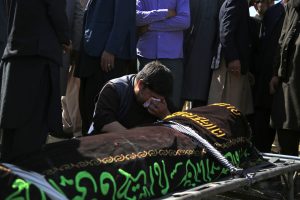On Saturday, May 8, in Dasht-e Barchi, a predominantly Hazara-populated area in Kabul, Afghanistan, 85 school children, primarily girls, were massacred and at least 147 wounded.
While violence is widespread across Afghanistan and the suffering of Afghans is collective, Hazaras are consistently targeted for persecution and murder. The May 8 massacre is, alas, just the latest mass brutality against a community that wears the sad reputation of being one of the world’s most persecuted peoples. Understanding the history of Hazara persecution not only places the May 8 massacre in context but provides a terrifying warning of potential violence to follow.
Hazaras now make up roughly a quarter of Afghanistan’s population of 38 million, but they were once the largest Afghan ethnic group, constituting nearly 67 percent of the total population of the state. The decline is due to the sad history of the Hazaras. Sanctioned state persecution against the Hazara began in the late 19th century. Since that time about 60 percent of the Hazara population has been eliminated in different ways: killed, sold into slavery, or forced into exile.
Suppression, discrimination, and persecution against Hazaras endures. The Taliban’s massacre of thousands of Hazaras in Mazar-e Sharif in 1998 remains one of the most notorious atrocities in Afghanistan’s 40-year conflict. The Taliban target the ethnic group due partially to the religious affiliation of Hazara people with Shiite Islam. During the mass killing, the Taliban presented three options to the Hazaras: “become Sunnis, leave Afghanistan, or risk being killed.” Author Ahmed Rashid described this massacre as “genocidal in its ferocity.”
Members of Afghanistan’s Hazara community remain continually vulnerable to violence. Hazara culture promotes democratic values of social liberalism and progressive thinking, and the community has embraced expanded educational opportunities. These cultural distinctions are at odds with the predominantly conservative religious views of wider Afghan society, and particularly with the Taliban. The Hazaras’ success, strides and liberation pose a threat to ethnocentric circles.
Hate speech and dehumanization against Hazaras remains rife. Popular derogatory epithets marginalize Hazaras at best as rubes or outsiders, at worst as animals. Hazaras largely speak Hazaragi, which is a dialect of Persian. Their Turko-Mongol heritage and their distinct features have set them apart as a de facto lower caste, based on shallow, racist stereotypes. An ugly Taliban saying about Afghanistan’s non-Pashtun ethnic groups went: “Tajiks to Tajikistan, Uzbeks to Uzbekistan, and Hazaras to goristan.”
“Goristan” is the Pashto word for “cemetery.”
The genocidal persecution of the Hazara is maintained in contemporary attitudes throughout Afghanistan. Attacks against newborn Hazara babies, pregnant mothers, school children, girls, and youth are a matter of record. Hazaras have faced violence at educational centers and schools, fitness centers, wedding halls, and maternity wards. The students killed on May 8 were not simply murdered for going to school, but for being Hazara. Growing educational attainment by those from the Hazara community is viewed as a political threat in reactionary circles, and as an active challenge to the prevailing ethnic status quo.
Understandably, the persecution of the Hazaras has resulted in thousands seeking refuge across international borders in Europe, the U.K., and Australia. Currently, there are around 2.6 million registered Afghan refugees across the globe. The continuing volatile and unsafe conditions in Afghanistan make global refugee resettlement for Hazaras an urgent humanitarian priority.
International engagement with Afghanistan in the wake of U.S.-led intervention has measurably improved conditions for many in that country, but the achievements for its minorities are fragile and seriously destabilized by the impending military withdrawal. Emerging power dynamics in a post-withdrawal Afghanistan leave the Hazaras uniquely vulnerable to ongoing violence. To ensure their protection, Afghan Hazaras on temporary visas must be spared deportation from the EU, and Hazara asylum seekers in Australia need ongoing refugee protection. Proactive governments could meet humanitarian obligations by increasing resettlement numbers for the most vulnerable Hazaras: women and girls, the youth, and victims of these tragic attacks.
There are thousands of Hazara refugees who have lived in limbo in detention centers in the EU and Australia for many years, waiting for their claims to be processed. Their families remaining in Afghanistan have waited much longer to get out of the exact kind of danger demonstrated by the May 8 attack in Dasht-e-Barchi. In a rapidly deteriorating political environment, Hazaras are genuinely fearful for their lives. Protection visas and resettlement pathways from refugee-receiving nations are a matter not just of urgency for many Hazaras, but potentially the difference between life and death.
Beyond protective measures, the global community can offer targeted humanitarian support to Hazaras remaining in Afghanistan by expanding scholarships and sponsorships to students at Hazara universities in Kabul such as Avicenna University and Gawharshad University. Resourcing institutions and opportunities strengthens the Hazara community in the face of shifting domestic power relationships. Expanding institutional exchange programs also will enable Hazaras to develop meaningful international networks of support. As the foreign military presence decreases, the need for increased international engagement with Hazara civil society organizations grows more crucial.
Anyone who believed that the American intervention in Afghanistan was to promote democratic values must not abandon that project as U.S. troops withdraw. A vulnerable community is relying on its international friends to maintain humanitarian protection and institutional engagement as it confronts the dangers of a destabilized and chaotic time. Alas, if that project is abandoned, and Afghanistan forgotten, the Hazaras will remain amongst the most persecuted people in the world, and the mass murder of its children will be only the beginning.

































